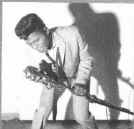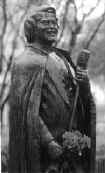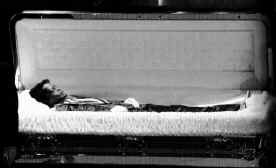
James Brown Show, with the Famous Flames Johnny Terry,
Bobby Byrd and Bobby Bennett up front and James Brown at the mike.

Brown's revised contract with King in 1965 gave him complete artistic
control. He revamped the band under the direction of Nat Jones and became a world
class force in popular music with "Papa's Got a Brand New Bag"(#1 R&B).
Doing away with conventional
verse and chorus structure, eliminating chord progression, he distilled his sound to its
essence: rhythm. The following records "I Got You (I Feel Good)" and "It's
a Man's, Man's World" also topped the R&B charts. Alfred "PeeWee" Ellis
replaced Jones as bandleader and Brown continued to have hits with "Cold Sweat,"
"I Got the Feelin'," "Say it Loud, I"m Black and I'm Proud,"
"Give It Up or Turn It Loose," and "Mother Popcorn" - which were also
pop hits.
conventional
verse and chorus structure, eliminating chord progression, he distilled his sound to its
essence: rhythm. The following records "I Got You (I Feel Good)" and "It's
a Man's, Man's World" also topped the R&B charts. Alfred "PeeWee" Ellis
replaced Jones as bandleader and Brown continued to have hits with "Cold Sweat,"
"I Got the Feelin'," "Say it Loud, I"m Black and I'm Proud,"
"Give It Up or Turn It Loose," and "Mother Popcorn" - which were also
pop hits.
In the latter Sixties Brown became a cultural hero "Soul Brother Number One". As a black man of wealth, independence and influence, he was a symbol of self-determination over racism. He took that responsibility seriously with his songs containing direct socially messages. He sponsored programs for ghetto youths, spoke at high schools, invested in black businesses, performed for the troops in Vietnam and went on television to plead for calm after the assassination of Martin Luther King.
|
|
|
In late 1969, Brown faced a mutiny by his celebrated Sixties band , which included saxophonist Maceo Parker and trombonist Fred Wesley. Brown hired hot young instrumentalists, who with his nurturing, continued to develop a sound that would be called funk. The new band called the J.B.s, included brothers William and Phelps Collins, whose distinctive bass and lead playing, respectively ushered in a new sound in soul music. The Collins left after a year joining George Clinton's Parliament Funkedelic. Key Sixties key Sixties band members saxophonist St. Clair Pinckney and guitarist Jimmy Nolan, as well as Parker and Wesley , eventually returned, but the only consistent member was John "Jabo" Starks, who had originally joined the band in 1965.
Brown had been managing himself since the death of his manager in the late Sixties. In 1971 he signed with Polydor Records, an international company, and sold it his entire back catalogue. His records continued to sell in the millions. Though R&B chart toppers, they increasingly failed to make the pop Top Twenty.
Around 1975 Brown's popularity began to ebb. Financial difficulties forced him to sell his three black radio stations and jet. The U.S. government claimed he owed 4.5 million in back taxes, his son Teddy died in a car crash in 1973, and his second marriage ended. Young record buyers now favored heirs like Ohio Players, Kool and the Gang, and the Parliament/Funkadelic.
When disco peaked in the late Seventies, he promoted himself as "The Original Disco Man." A cameo role in the 1980 film The Blues Brothers introduced Brown to a new generation. Returning to the stage, he drew much of his audience from the white punk-funk faction. In 1980 he recorded "Rapp Payback," a homage to earlier singles "Brother Rapp" and "The Payback," which preconfigured the enormous influence he would have on the rap scene.
By 1984 Brown's music had been claimed as the virtual basis for hip-hop beats; among
others. Kool Moe Dee and Eric B. & Rakim had hits by sampling Brown's rhythm, and his 1969
record "Funky drummer" began appearing in a many versions on rap and pop
records. Brown revival was further bolstered by "Living in America #4)," the
theme from Rocky IV. Recorded at the request of director Sylvester Stallone the single won
a Grammy in 1987 for Best R&B Performance. In 1989 Brown's auto biography James
Brown: The Godfather of Soul was published.
his 1969
record "Funky drummer" began appearing in a many versions on rap and pop
records. Brown revival was further bolstered by "Living in America #4)," the
theme from Rocky IV. Recorded at the request of director Sylvester Stallone the single won
a Grammy in 1987 for Best R&B Performance. In 1989 Brown's auto biography James
Brown: The Godfather of Soul was published.
In 1988 Brown's career ground to a halt. When his fourth wife, Adrienne,
reported beatings,  Brown was charged with assault with intent to murder and aggravated assault and
battery.. He surrendered in May to South Aiken County, South Carolina authorities and was
released on bond. Legal troubles followed in the next year with Adrienne being arrested
for alleged possession of PCP, announcing she'd was filing for legal separation, relenting
and withdrawing the assault charges.. Then Adrienne was was arrested again for PCP
possession and arson. In September, with rumors of his own PCP abuse and problems with
IRS, he allegedly threatened a group of people with a shotgun. An interstate car chase
with police ensued for which he received a six year sentence in a work release program.
Brown was charged with assault with intent to murder and aggravated assault and
battery.. He surrendered in May to South Aiken County, South Carolina authorities and was
released on bond. Legal troubles followed in the next year with Adrienne being arrested
for alleged possession of PCP, announcing she'd was filing for legal separation, relenting
and withdrawing the assault charges.. Then Adrienne was was arrested again for PCP
possession and arson. In September, with rumors of his own PCP abuse and problems with
IRS, he allegedly threatened a group of people with a shotgun. An interstate car chase
with police ensued for which he received a six year sentence in a work release program.
Paroled in 1991 after serving two years of his sentence, Brown returned to work with a pay preview television concert and a new album. With the release of Star Time, a four CD retrospective Brown's music was freshly available and his critical stature was unassailable.


On November 11, 1993 Ninth Avenue in Augusta, Georgia was renamed James Brown Boulevard in honor of Brown. Recently a life-size bronze statue of Brown was erected and dedicated to him here in Augusta (May 6, 05). It is on public display in an area of Broad Street in downtown Augusta
James Brown was inducted into the Rock and Roll Hall of Fame in 1986.
The Famous Flames were inducted into the Rock and Roll Hall of Fame in 2012.

James Brown died on December 25, 2006 in Atlanta, Georgia at the age of 73.